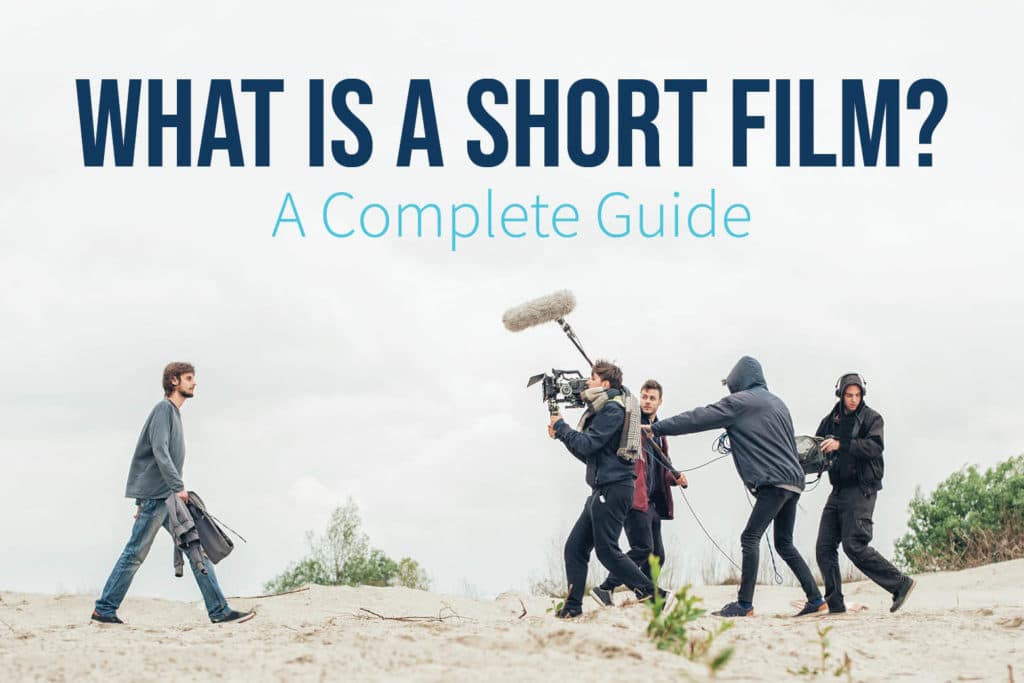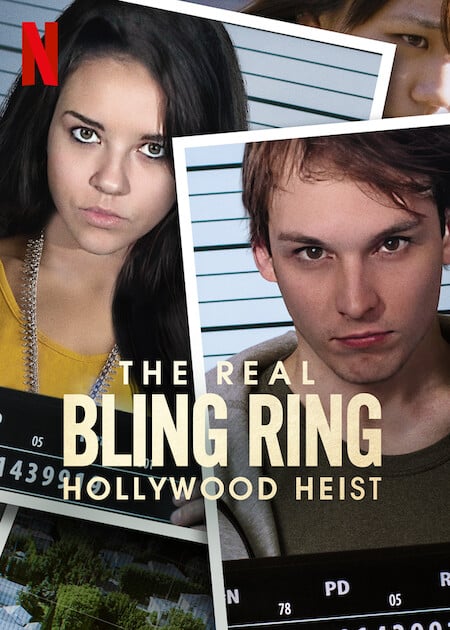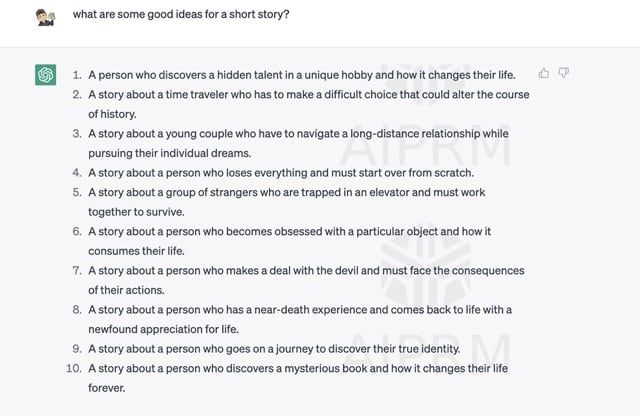
Staring at a blank page is a screenwriter’s worst nightmare. Your brain is full of cobwebs, maybe a tumbleweed or two.
You are struggling for ideas for your first script, or even your next one, racking your mind for that lightbulb moment, the idea that will change your writing journey forever.
Unfortunately, it is extremely rare for an idea to fall into your lap, complete and polished. Crafting a great idea for a short film is difficult, let alone developing that idea into a great script and eventually an amazing film.
So let’s get started with our list of 14 ways to get the juices flowing for your next short film script!
What is a Short Film?
A short film is an ideal starting block for any aspiring writer and/or filmmaker. Within the industry, a short is any film under 40 minutes long, including credits. Anything over that would be considered as a feature, although most feature films will run from around 90-120 minutes and over.

So, if we consider how long up to 40 minutes would be in script form, we would be looking at around a 40-page script. The convention determines that one page of script equals one minute of screen time.
Generally, shorts have naturally lower budgets, making them more accessible for fledgling filmmakers to develop themselves or with a small crew for the purpose of creating what we would call a ‘calling card’.
A portfolio of these ‘calling card’ projects can then be built up relatively quickly to show to and gather feedback from peers or those more experienced in the industry. If your short film proves to have a positive reception, you can later develop it into a feature!
To learn more about short films and how they can help you break into the film industry, click here.
14 Idea Generation Tips for Your Next Short Film
#1 – Watch and Read
Watch as many short films as you can and dissect them within an inch of their lives! Study how the story is crafted and how the scenes connect. Also consider characterization, use of dialogue and exposition.
If you can, read the script alongside watching the film. It is an extremely beneficial way to discover how the script and storytelling translates on screen.
#2 – Use Your Life Experience
Audiences relate to authentic characters who have a story to tell. Using real-life experience to inform your next short film script can be invaluable. You do not necessarily need to write something autobiographical, but think about significant experiences you have had or interactions with a particular person you would love to recreate in film.
Or perhaps you know someone with a fascinating story that would translate brilliantly into film. Ensure to ask permission before you use their story, of course!
#3 – Refer to the News
Whether you look in news archives or more recent, topical events, the news can be a mine of information and stories. We would recommend looking at current affairs to fully understand the stories that matter to people and what is affecting them on the daily.
By taking inspiration from something happening right now, you can craft it into a thought-provoking short film for now and for the future.
Countless successful films have stemmed from historical and reported events. The Bling Ring (2013) recounted the events originally reported by a Vanity Fair article about a group of LA teenagers tracking celebrities through social media and breaking into their mansions to steal.

#4 – People Watch and Eavesdrop
Now this may sound a little strange, but watching people in public can be a great way to spark ideas. Whether that be a coffee shop, mall, doctor’s waiting room or just on the street, people are at their most authentic in their day to day lives.
Always being alert and open to spotting something inspiring or hearing something that stops you in your tracks can be a great basis for a short film.
#5 – Research a Topic You Are Passionate About
If you are struggling with where to begin for a short film idea, do some research on what you love.
Hobbies can be a great starting point, or a period in history, for example. From there, take what stands out to you from your research and create a story.
Related Celtx Blog: Writing as a Hobby: Tips and Advice for Beginners
#6 – Use Inspiration From Nature
Imagine our ancestors gathered around the campfire, telling stories. Stories began in the great outdoors, so perhaps it is time to return there for ideas for your next script! Stretch your legs in your local park, or visit somewhere you have never been before.
There is a whole world out there to use to spark our imaginations.
#7 – Consider a Budget…and Stick To It!
You may think confining yourself creatively would have a negative effect, but it doesn’t! Restricting a budget for your short film forces you to think outside the box and find ways to cut costs as much as possible. Think about what is accessible to you before you start brainstorming, and work from there.
Some of the world’s best filmmakers have pulled off awesome budget shorts. Taika Waititi’s Two Cars, One Night (2004) was nominated for an Oscar, which depicted two kids meeting in a parking lot. One location. Three characters. Tiny budget.

#8 – Read, Read, Read
Reading as much as you can, whether that be novels, comics, newspapers, magazines, stage plays, screenplays or anything you can get your hands on, will open your imagination up to many more possibilities.
Plus, you will notice your vocabulary expand considerably, giving you more to work with and utilize in your own writing.
As well as fictional works, dip into some screenwriting books to learn and hone your writing craft. There are many great options to choose from: Save the Cat (Blake Snyder), Story (Robert McKee) and The Hero’s Journey (Christopher Vogler) are great ones to start with!
#9 – Give Yourself a Time Constraint
As with the budget we talked about earlier, try to tell a story in 20 pages, 10 pages, or even less. This forces you to be creative with your structure and storytelling skills, as well as focus on the core of your story and what is most important. You could be surprised with what you come up with!
Also give yourself a time constraint when writing your short. For example, if you wrote a page a day for thirty days, the result would be a short film script. Then another thirty days for edits and rewrites. Then set yourself a deadline for budgeting, finding crew, scouting locations, and for the shoot itself. You will find that if you hold yourself accountable, no matter the time frame, whether it is months or even years.
#10 – Use AI
A fairly new concept in the creative industries is the use of AI to generate new ideas. There are various story generator tools online that can help you springboard an idea if you are really struggling.
Jasper.ai and Rytr.me are good options, though they come at a price after a short free trial. Chat GPT is another option that is receiving a lot of attention at the moment. We would not necessarily depend on AI software, but they are great tools to get you started.

#11 – Create a New Twist
Many great films borrow from others, so why should yours be no different? Why not put a twist on your favorite film or write an existing scene or script from a different character’s perspective? What if the antagonist became the protagonist? What if the hero does not succeed?
#12 – Confine Yourself to Writing in One Setting
As we have said, sticking to one setting within your short film can do wonders for keeping your costs down, but it can also work wonders on your creativity. Consider one location, who would go there, and what conflict would ensue there?
What stops the characters from leaving?
#13 – Find Inspiration From Music
Lyrics are a fantastic source of inspiration and tell a story within themselves. Yet all of us can have very different affiliations with songs, leaving lots of interpretation with which to play and create.
Songs have inspired many great films over the years. Blue Velvet (1986) was based on a song of the same name by Tony Bennett, while the song Pretty Woman by Roy Orbison inspired the 1990 film starring Julia Roberts.
#14 – Keep it Simple
Last but by no means least, keep it as simple as possible. You simply do not have the time or space in a short film for infinite twists, turns and action sequences. Keep your story as simple, but as authentic as possible. Your characters, story and plot are crucial, so work on getting those right.
Also, do not overcomplicate your story with combined genres or multiple plotlines. Stick to no more than three characters and two locations.
Ready to start writing? Check out our 9 tips for How to Write a Script for a Short Film!
FAQs About Short Films
How Long is a Short Film?
Short films start at any length and end usually at the 40-minute mark. Anything more than that is generally considered to be a feature film.
How Do I Structure a Short Film?
The structure of a short film is no different to that of a feature, depending of course on which method you decide to use. If you are just starting out on your writing journey, the three-act structure will work perfectly well.
As the name suggests, you break your story down into three acts:
Act I – introduce your audience to the characters and their world.
Act II – introduce and explore the core idea of your film through conflict.
Act III – wrap up your story and resolve the conflict.

Make sure you write an outline for your short film first, before moving onto the script. If you have a solid and polished story ready to go, it will make writing the script so much easier.
How Much Does a Short Film Cost to Make?
This completely depends on the film and can vary, depending on whether you are including visual effects, how many locations you have, and how large your cast is. The rule of thumb is that for every finished minute, you will be spending around $1,000 for a professional shoot.
So if you make a ten-minute short, your total budget will be around the $10,000 mark.
Or, if you will be shooting the film as a freelancer, you can afford to spend as much or as little as you want, or can! If you are sticking to one location and are recruiting friends and peers to help, you could in theory complete a shoot for a few hundred dollars. Bear in mind that the less complex shots you have, the less crew you will need, and therefore, the cheaper it will be.
Remember, story is everything, so no matter how big your budget, if the story is weak, the film will be too!
What Do I Do Once I Have Written my Short Film?
There are a number of routes you can go down. Before you pursue anything, polish your script to the best it can be. Rewrite, and edit, and rewrite until you are more than happy with it. Seek feedback from your peers or from friends and family you trust. Put the hard work on the script in now, and it will pay off later.
Option one is to make your film, which we would highly recommend. If you have taken into account budget, location, cast and crew, you will be in a fantastic position to make the shoot happen. Seek out other filmmakers in your area. Could you collaborate on something?
Option two is to enter your script into festivals and competitions. Sites like FilmFreeway and Coverfly are ideal websites to find these types of contests. These do cost money, though, so ensure you do your research and make sure you find the contest right for you and your script.
If you submit a script to a festival or competition and do well, you can win cash prizes, win mentorships, and even get your work seen by those at the top of their game in the film industry.
Option three is to use your script as a calling card to submit to literary agencies and managers with a view to be represented by them. Ensure you have a portfolio of polished scripts ready before you do this! Looking for an agent? Check out our top list of agencies and agents!
Whatever you decide to do, do not leave your script in a dark, cold drawer somewhere. You have put the hard work into it, now your short script or film needs to be seen!

How Do Short Films Become Nominated for Oscars?
There is a journey involved before a short film makes it to the Oscars. First, you would need to submit your finished film to one of ten qualifying film festivals in the US. One example would be the Sundance Film Festival, to which thousands of shorts are submitted each year.
Once you enter a qualifying festival, you need to win in order to move forward to the Academy for voting. It is a tough journey, but not an impossible one!
How Can I Make Money From my Short Film?
The film industry is a business just like any other. One which makes billions of dollars a year, with thousands of influential studios and production companies working in it. But you can make money with a short film, especially with new advancements in technology.
Online monetization is one way to make some money back on your investment in your short film. Platforms like YouTube and Vimeo will pay you a percentage of money per a certain amount of views on advertisements which are placed before, during or after your video. However, you will need a large following and several short films posted to make a substantial return.
There are other routes, such as Amazon Video Direct, but they have many hoops to jump through. Definitely do your research.
So there we have it! Our top 14 tips to generate ideas for your short film, plus some bonus FAQs.
Inspiration can come from anywhere, so always keep an open mind; you never know when that eureka moment will arrive. For even more advice on writing the best short film possible, click here!
Are you ready to turn your creative vision into a short film masterpiece?
Celtx is here to help! Our software provides all the tools you need to take your ideas from concept to screen. Whether you’re just starting out or you’re a seasoned filmmaker, Celtx has everything you need to bring your short film to life.
Sign up today and start exploring the endless possibilities!

